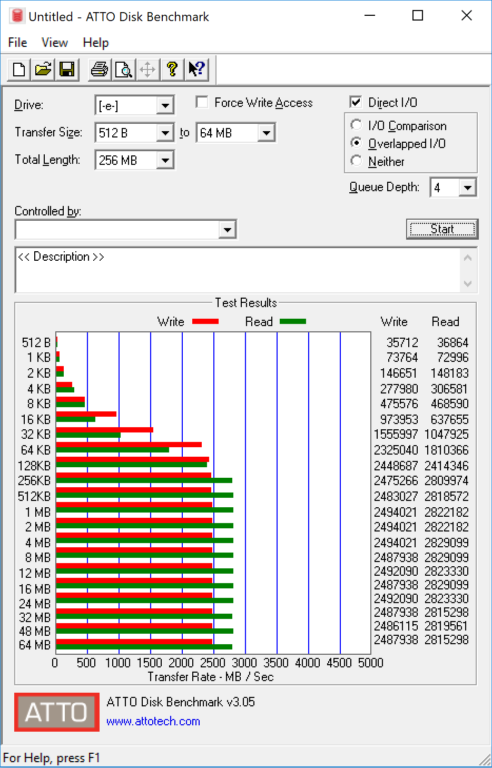ATTO Disk Benchmark is perhaps one of the oldest benchmarks going and is definitely the main staple for manufacturer performance specifications. ATTO uses RAW or compressible data and, for our benchmarks, we use a set length of 256mb and test both the read and write performance of various transfer sizes ranging from 0.5 to 8192kb. Manufacturers prefer this method of testing as it deals with raw (compressible) data rather than random (includes incompressible data) which, although more realistic, results in lower performance results.
ATTO Disk Benchmark presents a great speed progression as sample data sizes increase. Because of the Kingston DCP1000 in use, we can comfortably believe that the Thunderbolt 3 overhead is right around that 2.8GB/s read mark
CRYSTAL DISK BENCHMARK VER. 5.2.1 X64
Crystal Disk Benchmark is used to measure read and write performance through a sampling of random data which is, for the most part, incompressible. Performance is virtually identical, regardless of data sample so we have included only that using random data samples.
High sequential data transfer speeds of 2.8GB/s and 2.7GB/s are great data transfer rates for anyone running Thunderbolt 3. Looking a bit lower at the low 4k random read and writes, we would have liked to see a bit stronger performance there.
The toughest benchmark available for solid state drives is AS SSD as it relies solely on incompressible data samples when testing performance. For the most part, AS SSD tests can be considered the ‘worst case scenario’ in obtaining data transfer speeds and many enthusiasts like AS SSD for their needs. Transfer speeds are displayed on the left with IOPS results on the right.
In examining the AS SSD results, IOPS is very much the strongpoint with 412K IOPS read and 563K IOPS write, although that ISO transfer speed of 2.2GB/s can’t be missed.
ANVIL STORAGE UTILITIES PROFESSIONAL
Anvil’s Storage Utilities (ASU) are the most complete test bed available for the solid state drive today. The benchmark displays test results for, not only throughput but also, IOPS and Disk Access Times. Not only does it have a preset SSD benchmark, but also, it has included such things as endurance testing and threaded I/O read, write and mixed tests, all of which are very simple to understand and use in our benchmark testing.
 The SSD Review The Worlds Dedicated SSD Education and Review Resource |
The SSD Review The Worlds Dedicated SSD Education and Review Resource | 


Could you use an Asus Hyper M.2 X16 Card with 4 NVMe sticks, possibly double that and scary raid a few of them?
We don’t have that. Sorry.